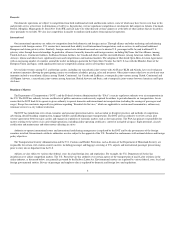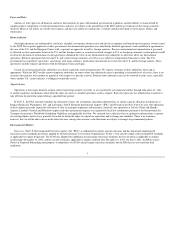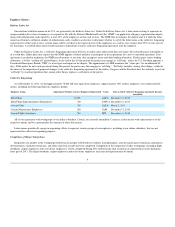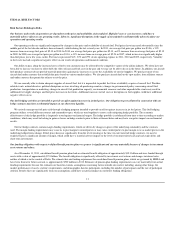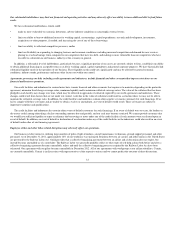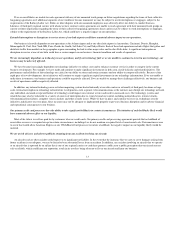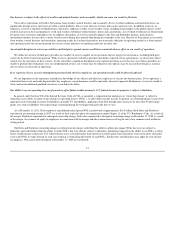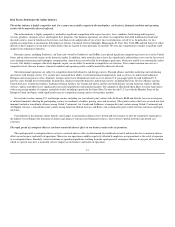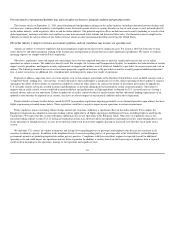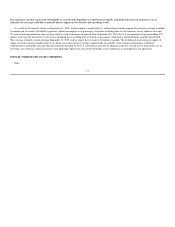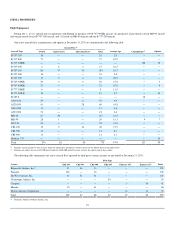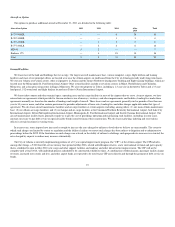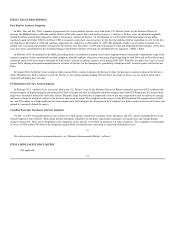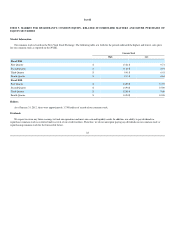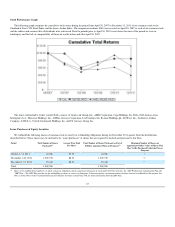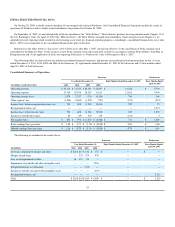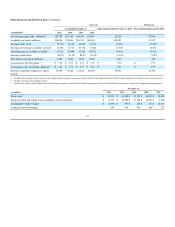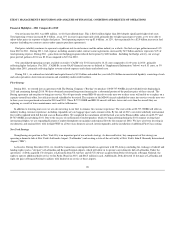Delta Airlines 2011 Annual Report Download - page 22
Download and view the complete annual report
Please find page 22 of the 2011 Delta Airlines annual report below. You can navigate through the pages in the report by either clicking on the pages listed below, or by using the keyword search tool below to find specific information within the annual report.
Terrorist attacks or international hostilities may adversely affect our business, financial condition and operating results.
The terrorist attacks of September 11, 2001 caused fundamental and permanent changes in the airline industry, including substantial revenue declines and
cost increases, which resulted in industry-wide liquidity issues. Potential terrorist attacks or security breaches or fear of such events, even if not made directly
on the airline industry, could negatively affect us and the airline industry. The potential negative effects include increased security (including as a result of our
global operations), insurance and other costs and lost revenue from increased ticket refunds and decreased ticket sales. Our financial resources might not be
sufficient to absorb the adverse effects of any further terrorist attacks or other international hostilities involving the United States.
The airline industry is subject to extensive government regulation, and new regulations may increase our operating costs.
Airlines are subject to extensive regulatory and legal compliance requirements that result in significant costs. For instance, the FAA from time to time
issues directives and other regulations relating to the maintenance and operation of aircraft that necessitate significant expenditures. We expect to continue
incurring expenses to comply with the FAA's regulations.
Other laws, regulations, taxes and airport rates and charges have also been imposed from time to time that significantly increase the cost of airline
operations or reduce revenues. The industry is heavily taxed. For example, the Aviation and Transportation Security Act mandates the federalization of certain
airport security procedures and imposes security requirements on airports and airlines, most of which are funded by a per ticket tax on passengers and a tax on
airlines. The federal government has on several occasions proposed a significant increase in the per ticket tax and has recently proposed additional departure
fees. A ticket tax increase or additional fees, if implemented, could negatively impact our results of operations.
Proposals to address congestion issues at certain airports or in certain airspace, particularly in the Northeast United States, have included concepts such as
“congestion-based” landing fees, “slot auctions” or other alternatives that could impose a significant cost on the airlines operating in those airports or airspace
and impact the ability of those airlines to respond to competitive actions by other airlines. In contrast, the failure of the federal government to upgrade the
U.S. air traffic control system has resulted in delays and disruptions of air traffic during peak travel periods in certain congested markets. The failure to
improve the air traffic control system could lead to increased delays and inefficiencies in flight operations as demand for U.S. air travel increases, having a
material adverse effect on our operations. Failure to update the air traffic control system in a timely manner, and the substantial funding requirements of an
updated system that may be imposed on air carriers, may have an adverse impact on our financial condition and results of operations.
Events related to extreme weather delays caused the DOT to promulgate regulations imposing potentially severe financial penalties upon airlines that have
flights experiencing extended tarmac delays. These regulations could have a negative impact on our operations in certain circumstances.
Future regulatory action concerning climate change and aircraft emissions could have a significant effect on the airline industry. For example, the
European Commission has adopted an emissions trading scheme applicable to all flights operating in the European Union, including flights to and from the
United States. We expect that this system will impose additional costs on our operations in the European Union. Other laws or regulations such as this
emissions trading scheme or other U.S. or foreign governmental actions may adversely affect our operations and financial results, either through direct costs
in our operations or through increases in costs for jet fuel that could result from jet fuel suppliers passing on increased costs that they incur under such a
system.
We and other U.S. carriers are subject to domestic and foreign laws regarding privacy of passenger and employee data that are not consistent in all
countries in which we operate. In addition to the heightened level of concern regarding privacy of passenger data in the United States, certain European
government agencies are initiating inquiries into airline privacy practices. Compliance with these regulatory regimes is expected to result in additional
operating costs and could impact our operations and any future expansion. In addition, a security breach in which passenger or employee data is exposed
could result in disruption to our operations, damage to our reputation and significant costs.
16


